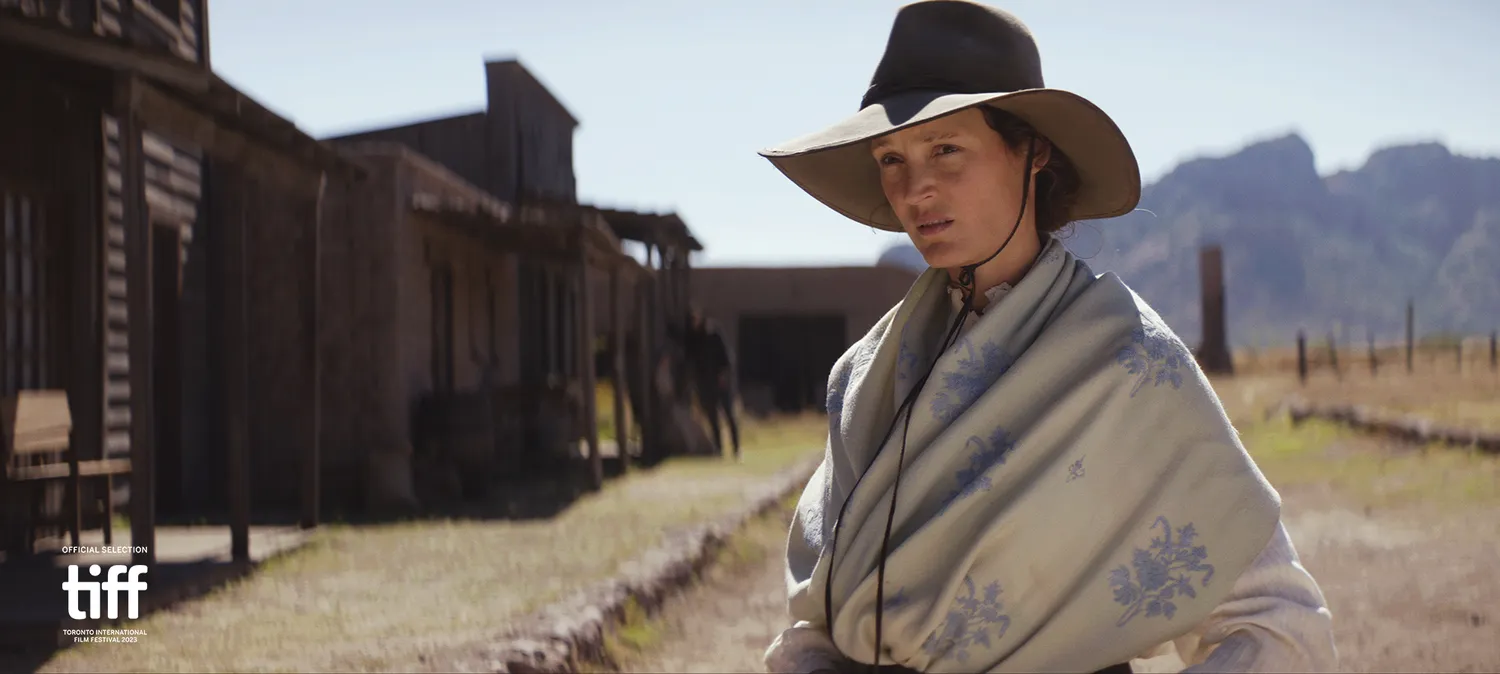
Film Review: The Dead Don’t Hurt
Film
The Dead Don’t Hurt
Director: Viggo Mortensen
Talipot Studio and Recorded Picture Company
In Theaters: 05.31
The Western is fixin’ to stake a claim and make a comeback this year, with multiple films headed for release; the biggest is Kevin Costner‘s much-hyped, two-part epic Horizon. While we wait for that, another actor/director, Lord of the Rings star Viggo Mortenson, has saddled up to bring us The Dead Don’t Hurt, a melancholy tale of star-crossed lovers in the Old West.
In the 1860s, Vivienne Le Coudy (Vicky Krieps, Phantom Thread, Old) is a strong-willed French-Canadian woman who meets a handsome and gentle Danish immigrant named Olsen (Mortensen) in San Francisco. The two hit it off quickly, and Vivienne agrees to accompany the gentleman to his home near Elk Flats, Nevada, where he works as a carpenter. The two fall madly in love and it seems that nothing can come between them, until the American Civil War breaks out (the first one, not the one with Kirsten Dunst) rears its ugly head, and when Olsen decides to enlist to fight for the Union, Vivienne cannot understand or support his decision. Left alone in a town run by a corrupt Mayor (Danny Huston, The Constant Gardener, Wonder Woman) and a scheming rancher, Alfred Jeffries (Garret Dillahunt, Raising Hope, Where the Crawdads Sing), Vivienne gets a job in the saloon, where she faces unwanted advances from Mr. Jefferies’ son, Weston (Solly McLeod, Outlander, Jericho Ridge). When Olsen finally returns from battle, both he and Vivienne must come to terms with the changes that have taken place within themselves and find ways to bridge the distance between them.
On the surface, the story seems straightforward enough, though Mortensen seems determined to fix this by employing a nonlinear narrative structure that’s reminiscent of Christopher Nolan, though with considerably less clear visual cues. The result is that you may find yourself halfway through the film before you finally start getting a feel for the disparate timelines, and a good deal of patience and focus is required. The opening sequence takes place near the end of the story, as an innocent man is brutally gunned down in Elk Flats, and begins the plot thread of Olsen tracking down the fugitive killer. Meanwhile, we periodically cut to Vivienne’s childhood, where her mother (Véronique Chaumont, Aller Simple) tells young Vivienne (Eliana Michaud) stories of Joan of Arc, and of course we go back to the primary throughline, Vivienne and Olsen’s love story.
Perhaps the biggest problem with this technique is that the violent (and impressively staged) opening scene gears the audience up for an entirely different type of Western than the one they are getting, and Mortensen is likely to alienate a chunk of his audience and make them more impatient with the deliberately passive and ponderous pacing of the picture. Those who go in expecting a slow-moving character piece may feel more satisfied, though the self-indulgent nature of the story structure creates a bit too much distance between the audience and the characters. Mortensen has lofty ambitions of putting a feminist spin on the genre, then severely undermines himself by recycling the tired and distasteful cliché of the brutalized woman and the man who must have his vengeance. There are also clear political overtones, as Mortensen touches on themes of class systems, the perils of capitalism and more, without ever managing to find enough insight to let it lead anywhere. The film is most satisfying when it’s content to merely paint pretty pictures, and the musical score, which Mortensen composed himself, is a sublimely ethereal mix of beauty and desolation.
Krieps and Mortensen both give very capable performances, though it’s difficult to escape the feeling that they are more powerful and interesting when they are apart and anchoring their own stories than when they share the screen, with Vivienne in particular being a far more compelling character on her own. Dillahunt and MacLeod have rather awkwardly been cast in a different movie altogether, sinking their teeth into their one-note roles of the Jefferies’ archetypal, scheming landowners. It’s hard to blame them for chewing the scenery as they spout colorful, old time-y dialogue such as the following exchange:
Jefferies Sr: It is a huckleberry above my persimmon to cypher how you turned out so ornery.
Jefferies Jr (drawing his gun): I will anoint your ass right here and now!
These unintentionally hilarious moments seem right out of Mel Brooks’ Blazing Saddles, and it seems as though Mortensen was so excited to work in the genre that he tried to make two wildly different movies at the same time.
The Dead Don’t Hurt is a horse opera that trots in a circuitous and at times circular route rather than galloping purposefully from one point to the next. There’s certainly a lot to admire about the film, and if you can’t resist a cowboy picture, it’s worth a look. Unfortunately, this jumbled and didactic slow burn is easier to admire than it is to truly enjoy. –Patrick Gibbs
Read more romance film reviews here:
Film Review: The Idea of You
Film Review: Challengers